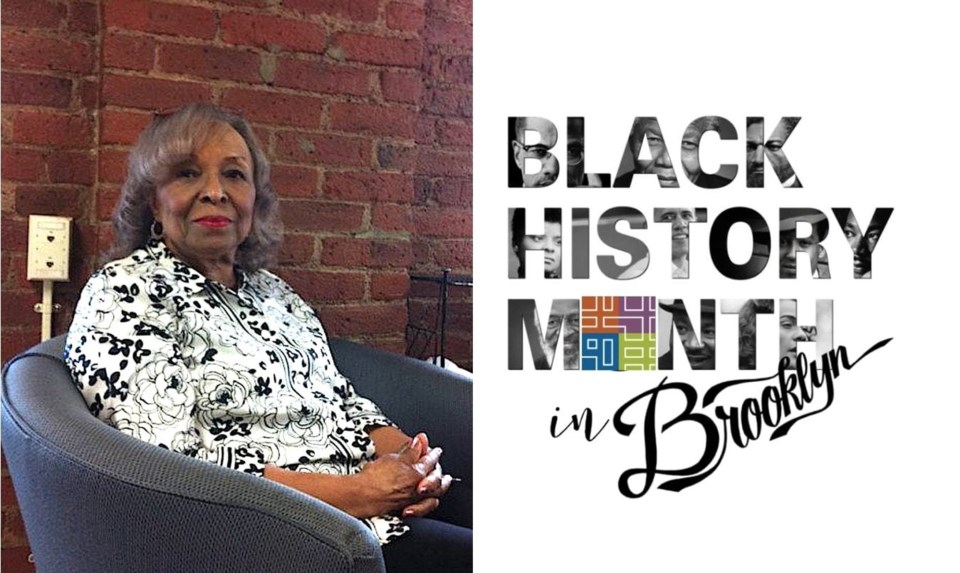The Honorable Judge Betty Staton is a former judge and currently the president of Brooklyn Legal Services.
Staton grew up during a time when racial segregation was the norm, and she has seen a great degree of social injustice. But, she says, segregation wasn't really the reason she decided to go into law.
Her family in the South was tenant farmers (sharecroppers), and her mother was "a domestic" who lived away from the home. When Staton was 7 years old, she moved with her mother and little sister up North, to a small but growing middle-class community in Bedford Stuyvesant.
Staton attended P.S. 70 on Patchen Ave. and Macon St., and was an Arista Student in high school. She then enrolled in Brooklyn College, but eventually dropped out when her husband-to-be insisted he would be the primary caretaker. However, that marriage never consummated.
After that, she decided, never again will she allow a man to sidetrack her future or thwart her educational pursuits. And so she enrolled back in college, to complete her associate's degree, and also in charm school, with the intent to become an early childhood educator, with a touch of charm and class to boot!
"I'm an Ophelia DeVore graduate," announced Staton proudly, of the once-popular charm school. "In those days, [Ophelia] was the lady to train women."
After graduating (from both schools), Staton took a job working in the garment district, then the state employment service and then with the federal government. By 1970, she was married, had two boys and began working as the registrar in a private-public school, before deciding to return to Brooklyn College and complete her bachelor's degree.
One day, one of her supervisors at work said to her, "Betty, you're smart. Why didn't you ever finish your degree?" said Staton. "She said, 'Go! Leave here. Go right now! Go register!' So I went down there that same day."
But even then, she had not yet found her way to law.
"What I wanted to do was work for my community," said Staton. "I wasn't sure what that was, but I just wanted to do whatever I could to help the people in my community. And I wanted to work with them directly—not in a corporate office."
Staton was pursuing a degree in psychiatric social work when, in 1974, out of the blue, a cousin suggested she become a lawyer. "I said, 'Wow,' and it was a like a whole thing opened up. I thought, 'Yes, that's what I'm supposed to do, work in law.'"
Staton was 41 years old when she earned a full scholarship into New York University's Law School. While at NYU, she founded the Black Latino Asian Pacific Alumni Association -- the alumni of color organization, which is still in existence.
Her first job out of law school was in legal services at the Bedford Stuyvesant Restoration Corporation where eventually she went on to become the deputy director and director of outreach and education.
In 1987, Staton co-founded the first African-American female law firm in the state of New York—Boyd Staton and Cave—on 27 Court St. in Downtown Brooklyn. Again, she continued her work in social services, until she was appointed by Mayor David Dinkins to serve as a family court judge in 1991.
"A lot of what happened in family court had to do with culture and misconceptions and stereotypes, and there is a glaring absence of judges of color to understand and deal with that," said Staton. "I was a latch-key kid: When I was 10 years old, my mom put a key around my neck, and I had to look out for my younger sister. But in this culture, if they find a 10-year-old watching a sibling, all the kids get emplacement."
This was her struggle far too often — trying to repair and maintain the family structure within poor communities.
"That's the discouraging part of practicing law: When you see a social problem that is widespread, unless you can address that problem in one case, you can't do anything but see the same issues over and over and over again," she said. "But I was very blessed to be able to serve there; it was my ministry."
Eventually, Staton was forced to retire in 2004 and returned to her work at Bed-Stuy Legal Services. After a few years, she went back to work in family court as a per diem Judicial Hearing Officer (JHO), a position they have since eliminated due to budget cuts.
Now, she is back home at Brooklyn Legal Services, providing free counsel and representation to local residents in the areas of housing, foreclosure, SSI disability, income tax and immigration.
Make no mistake, Judge Betty Staton works hard, but she still takes time out to enjoy herself. She loves to dance (Latin dancing is her favorite) and is an active member at her church, Emmanuel Baptist, in Clinton Hill, where she now lives.
"There are only two important questions you should ask yourself in life, and that is, 'Did you find joy in your life, and did your life bring joy to someone else?' And that's the bottom line," said Staton.
"You have to find your personal joy. And when you find it, you have to take it. But you also have to be mindful that you have to give joy to somebody else. You do. That's what I try to do."
Judge Betty Staton, we acknowledge your enormous service, and we honor your contributions.
*Source: patch.com




